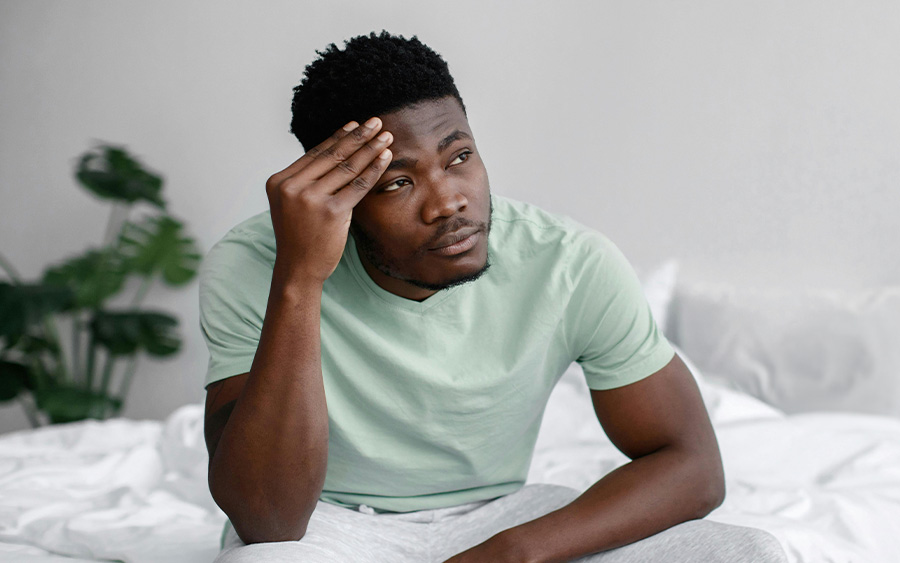Men’s mental health needs more open and informed conversations to discuss the facts and move away from the stereotypes that have persisted through the ages. Let’s dive in and explore 5 facts and myths that can help us destigmatize men’s therapy.
Despite mental health gaining much more attention in the last few years, men’s mental health continues to be a topic that often flies under the radar.
There are still a lot of misconceptions and stigma around mental illness and seeking support. Particularly for men all of this is still very much tied to outdated views of masculinity and gender roles. Many men continue to be raised to live by the “man up” and “boys don’t cry” mottos. Instead of being encouraged to share (or sing with Kenergy about) their fragilities. Yes, it’s an “I’m Just Ken” reference.
Only by understanding the facts and debunking the myths, we can promote healthier attitudes and move toward a society where working on ourselves is seen as a strength.
So, let’s start with dispelling the myths and then move forward to the facts about men’s mental health.
5 Myths About Men’s Mental Health
Myth: Men don’t know how to take care of themselves
There’s a persistent myth that men are inherently less capable of caring for their well-being and overall health. However, this misconception overlooks the fact that men have positive coping strategies to prevent and maintain their mental health, including eating healthy, keeping busy, exercising, taking time out, resorting to humor, rewarding themselves, and helping others.
While it’s true that women are more likely to seek support, we’ve also been witnessing an increase in men’s help-seeking behaviors. By continuing to promote men’s mental health awareness, we can encourage them to speak openly about their issues and seek help more promptly.
Myth: There’s no point in talking about mental health problems
Ignoring a problem doesn’t make it go away. You can probably remember a time when you had a toothache (or any other ache) and delayed a visit to the doctor because it didn’t seem that bad at first. Probably there were times when it seemed almost like the pain went away. But then when you finally got to the doctor, you realized that it got much worse — it was growing silently. And it’s not much different with our mental health aches.
Today’s society still pressures men to suffer in silence, to hide away their emotions, to “tough it out”… However, research tells us that psychotherapy — or talk therapy — is effective in improving our emotional, as well as, our physical well-being. In fact, 75 percent of people who seek psychotherapy report several benefits, from symptom relief to fewer medical problems, and even increased job satisfaction.
Myth: Alcohol helps men relax and open up about their feelings
We’ve all seen that typical movie scene of a “guys’ night”, where a group of men, after having more than a few drinks, start professing their love for each other or having deep honest conversations. But we also know what happens the next day…
While alcohol may temporarily lower your inhibitions and make you feel more relaxed, over time it will only cause bigger problems. As the effect of alcohol wears off, we feel worse because of how withdrawal impacts our body and brain.
Moreover, heavy or long-term alcohol use can produce chemical changes in the brain and affect neurotransmitter activity, which can exacerbate feelings of depression, anxiety, and anger — the ones we were trying to get rid of in the first place!
Myth: Men don’t struggle with body image issues and eating disorders
Most of us think about body image issues and eating disorders as exclusively affecting women, but research paints quite a different picture. We know today that the number of men affected by these disorders has been increasing, fast. In fact, according to NEDA (National Eating Disorders Association), one in three people struggling with an eating disorder is male.
Men too are bombarded with images of the “ideal” body type and unrealistic standards of physical appearance, which can contribute to body dissatisfaction and disordered eating behaviors. So, why are we not addressing these issues in men?
Well, due to misconceptions and gender stereotypes, men are less likely to identify symptoms of eating disorders in themselves and seek treatment. The good news is that, once they do find support, they show similar improvements to women. That’s why, recognizing and raising awareness for these issues is essential for promoting body positivity and supporting men’s mental health.
Myth: Seeking help for mental health makes men weak
Perhaps one of the most damaging myths we continue to perpetuate is that seeking help for mental health issues is a sign of weakness or failure. While this affects everyone, it can be particularly conflicting with the mold society has carved for men — that leaves no room for vulnerability and emotional expression.
This idea of the stoic, unemotional, “real men” continues discouraging men from seeking the support they need to effectively address their struggles. So, what can we do to discredit years and years of traditional masculinity beliefs?
Well, that is going to be a long and challenging path that all of us need to walk. But a crucial step is to keep bringing up these discrepancies and reframing therapy as an opportunity to build on our strength, resilience, and commitment to a happier and healthier life — not just for men but for everyone!
Now that we covered some of the most widespread myths, let’s focus on what should really matter: the facts about men’s mental health.
5 Facts About Men’s Mental Health
Fact: Mental health conditions are on the rise, men included
Over the last few years, we’ve observed a concerning increase in the prevalence of mental health conditions worldwide, affecting individuals across all genders. A recent study with participants from 29 countries revealed that one in two people in the world will develop a mental health disorder by the age of 75. Adding that the two most common disorders among men are alcohol abuse and depression.
With the COVID-19 pandemic, the situation only grew worse, with the WHO reporting a 25% increase in the prevalence of anxiety and depression disorders around the world. More recently, the rising inflation and cost of living are putting additional pressure on individuals and families, especially vulnerable populations that are more exposed to ramping prices.
Fact: Men are much more likely to die by suicide
Statistics consistently show that men are at a significantly higher risk of suicide, almost four times more than women. Another concerning finding is that suicide is the second leading cause of death in the US between the ages of 12 and 24, with LGBTQ+ people being twice as likely to attempt suicide.
These numbers highlight the urgent need to address the unique challenges and barriers that prevent men — particularly adolescents, younger men, and the LGBTQ+ community — from seeking help for mental health issues. Effective suicide prevention strategies must prioritize early intervention, destigmatization, and accessible support networks tailored to men’s specific needs.
Fact: Black and BIPOC men face unique mental health challenges
While statistics show that the BIPOC community suffers from higher rates of mental health conditions, they are still a lot less likely to seek treatment — especially men. In fact, the National Survey on Drug Use and Health (NSDUH) reports that only 1 in 3 Black adults with mental illness receive treatment.
Systemic racism, discrimination, and disparities in accessing healthcare resources only exacerbate these challenges. Moreover, there’s still a huge lack of representation of BIPOC professionals in mental health care, with only 5% of Asian psychologists, 5% Hispanic, 4% Black, and 1% multiracial or from other racial/ethnic groups, according to APA. This makes the whole help-seeking process even harder for someone who is looking to work with a same-race therapist.
Fact: Alcohol and substance abuse can trigger other mental health conditions
Men are more likely to drink excessively, which puts them at higher risk of mental health issues. And here lies a double threat. On the one hand, as we saw earlier, heavy alcohol consumption can exacerbate depression, anxiety, and other conditions. On the other hand, people who are already struggling with mental illness might turn to alcohol or drug abuse to numb their symptoms or “self-medicate”, which can lead to addiction.
By far, the most common co-occurring disorders are anxiety, depression, trauma- and stress-related conditions, other substance use, and sleep disorders. In addition, when conditions co-occur there’s also a higher risk for relapses, hospitalizations, financial difficulties, family problems, isolation, and more.
To make a bad situation worse, substance abuse is also known to impair judgment and promote risk-taking behaviors, which only adds further layers of risk if these conditions continue to be overlooked and untreated.
Fact: Men manifest mental health symptoms differently
Men often exhibit symptoms in a way that doesn’t necessarily match our biased idea of mental health struggles. For example, men with depression may experience higher levels of anger, aggression, and irritability — instead of the “typical” sadness or persistent low mood that we more easily attribute to this condition.
By shedding light on these differences and helping people recognize alternative reactions to emotional distress we can contribute to more men receiving the support and care they need.
How Can We Support Men’s Mental Health
The first step to destigmatizing men’s therapy is to challenge traditional, toxic expectations surrounding masculinity and promote healthier and more positive ideas about what it means to be a man.
By spreading awareness and relevant information about men’s mental health facts, we can contribute to breaking down barriers and supporting help-seeking behaviors.
Creating supportive communities that foster an inclusive and empathetic approach toward mental health is essential, not only for men but for everyone’s journey toward a happier healthier life.
Start Men’s Therapy in Baltimore, MD
Are you looking for a professional who understands the unique challenges that surround men’s mental health? Our Baltimore therapists are experienced in creating a safe place for men to work on themselves, overcome their struggles, and regain the energy to pursue their goals.
Talk to us to learn more about men’s therapy or schedule a free 15-minute consultation and we will find you the therapist that best fits your needs!






